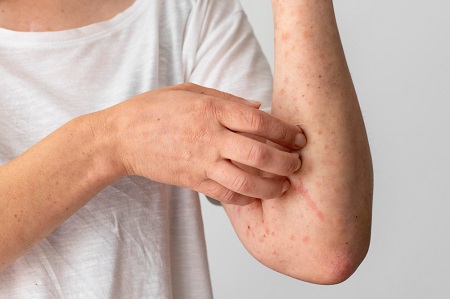Eczema is a skin condition that causes dry and itchy patches in one or more parts of the body. It is one of several skin inflammation conditions that fall under the category of dermatitis. Eczema is among the most common skin condition and while it is not life-threatening or contagious, it is not something that should be ignored. It weakens the skin’s ability to retain the moisture it needs to protect the body from external elements and may result in various types of infection. Eczema may be a constant problem or it may come and go at random intervals. While there is no effective cure for the condition, with the proper diagnosis and treatment, it can be controlled so that it does not have a negative impact on a person’s life.
The Causes
Eczema occurs in several forms, each with its own triggers. Among the causes/triggers are:
- The immune system: If the immune system is over-sensitive, it may react to minor irritants or allergens in the environment that do not affect others. When a trigger comes into contact with the skin, the immune system feels attacked and reacts to defend itself against what it thinks to be viruses and bacteria. This reaction takes the form of skin inflammation.
- Genetic factors: Those with a family history of eczema are more likely to suffer from the condition. A family history of allergies, asthma and hay fever also increases the likelihood of suffering from eczema.
- Environmental factors: With the ever-increasing amount of pollution, the possibilities of environmental triggers are increasing. Sensitive skin is more likely to react to exposure to smoke, airborne chemicals and toxins, pollen, dust, etc. Low humidity can also cause initial skin itchiness that turns into eczema.
- Direct contact: Contact with certain soaps, skin care products, and fabrics such as wool, animal hair and so on can trigger eczema.
- Mental or emotional triggers: High levels of stress and anxiety resulting from mental or emotional strain, depression, etc. can trigger hormonal and chemical imbalances in the body that may cause eczema.
The Symptoms
There is no specific appearance of skin irritation that may be defined as eczema. The same triggers in people with similar metabolisms and health may cause different forms of skin irritation. The flare-up may appear in different parts of the body. A person may suffer from eczema-related skin irritation in different parts of the body at different times or have various patches of irritated skin in different places at the same time. The most common parts of the body to be affected are the face, hands, wrists, back of the knees and feet.
Itching is often the first sign and a rash follows later. The skin often appears to be dry, red, cracked and leathery to the touch. When touched the skin may feel very rough or scaly. If a person is fair-skinned, the rash could be red in color at first and later turn brown. In people with darker skin, the skin pigment may be affected, causing patches of skin to be lighter or darker.
Eczema can affect infants and usually appears in the form of an oozing rash on the face, scalp, arms, legs, back or chest. The oozing from the skin may form a hard crust.
In older children and teenagers, the rash often appears on the inside of the elbows, back of the knees, wrists, ankles or neck. The rash may turn scaly.
These are a generalized description of the symptoms. They may take other forms of skin irritation of greater or lesser severity. A skin rash that does not fit these descriptions may still be eczema.
The Treatment
Non-prescription c and ointments for eczema should be used only with a doctor’s approval because in some cases they may make the condition worse by concealing the symptoms while the irritation spreads. That said, some things can be done at home to improve skin health and reduce irritation. These include:
- Bathing in lukewarm water. Avoid hot water.
- Applying moisturizer immediately after bathing to replenish skin oils.
- Paying special attention to moisturizing those parts of the body where the skin is dry and sensitive.
- Using mild or moisturizing soap for washing and bathing.
- Patting the skin dry with a towel after a bath instead of rubbing it.
- Wearing clothes made of natural fibers that are soft against the skin.
- Avoiding frequent extreme temperature changes such as constantly going in and out of an air-conditioned environment in hot weather.
- Avoiding scratching eczema-affected areas. This can be difficult, but applying a skin cream or moisturizer when the itching flares up can help to reduce the desire to scratch.
A doctor may prescribe several medications and forms of treatment, depending on the nature and extent of the condition. Among these are:
- Topical ointments and creams may be more effective than over-the-counter medications.
- Oral medications like immunosuppressants or corticosteroids. While effective, because of their strength and the possible side effects, their use must be monitored by a doctor.
- If there is a bacterial skin infection as part of eczema, antibiotics may be prescribed.
- Antihistamines may be prescribed to reduce the irritation and prevent unconscious scratching of the affected areas.
- Injected medications.
- Application of special barrier repair moisturizers to reduce moisture loss and repair damaged skin.
It is easy to pass off a skin irritation or rash as a minor issue, especially if it disappears on its own very quickly. However, if the condition persists for any length of time or becomes chronic (keeps reappearing) it is advisable to go to a multispecialty hospital with a dedicated dermatology department. This is where the best specialists are available, along with the most modern diagnostic and treatment procedures and protocols. If the diagnosis is that the irritation is nothing to worry about, there is no further need to worry. If the problem is diagnosed as eczema, then the best treatment is available under the same roof which means that the recovery will be as quick, smooth and trouble-free as possible. Once the skin has healed completely, the doctor will advise the patient on steps that can be taken to minimize the possibility of the condition arising again in the future.


